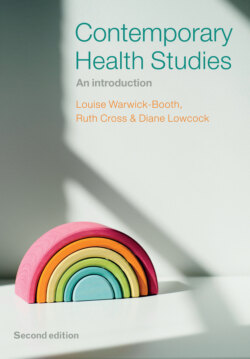Читать книгу Contemporary Health Studies - Louise Warwick-Booth - Страница 51
Children and young people’s perceptions of health
ОглавлениеMany studies have explored how children and young people talk about health. When asking children about their health, Brannen and Storey found that relatively few felt that their health was good (34% good, 48% fairly good, 9% not good and 9% unsure: Brannen and Storey, 1996: 25). The children in the study frequently linked their health status with eating habits. In a different study Brynin and Scott (1996) asked children if they thought that health was a ‘matter of luck’. They found that while younger children are more likely to accept this, older children are more likely to believe that health is under their own control and less a matter of luck.
Ideas about health appear to change with age during childhood and adolescence. Chapman et al. (2000) examined how children and young people define health. The younger children (aged 5–11 years) defined health in terms of diet, exercise and rest, hygiene and dental hygiene. They described health in more negative terms such as illness, smoking and the environment. The younger children also referred to emotions and mental health. The older children (over the age of 12 years) included things like smoking and drinking behaviours, having a healthy mind, feeling happy and confident and self-acceptance. Interestingly the older children also linked looking good, being happy and feeling confident with being healthy.
A more recent study, carried out in New Zealand, also explored children’s understandings of health and found that these were wide-ranging (Burrows and Wright, 2004). Being healthy was seen to be about being happy, thinking positively about yourself and being kind. In addition the children linked health with physical bodies, morality and character and also took into account mental, social, spiritual and environmental factors. A study by Downey and Chang (2013), which explored US college student’s perspectives on health, resulted in a four-component model by way of explanation. The four components were Social-Emotional Health, Positive Health Practices, Absence of Stress and Anxiety, and Adequate Rest. Interestingly, the absence of illness did not feature for these young people. The authors make the valid point that this result would be unlikely to occur with older people, who are more likely to have experienced ill-health. In a study on Korean mothers living in the USA Cha (2013) found that the women conceptualized health in relation to their role as a mother; to them being healthy was first and foremost about being able to care for their children. This also illustrates how concepts of health change across the lifespan as our personal and social circumstances change.
